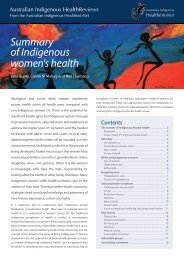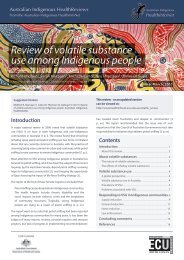hearing loss and the criminal justice system - Australian Indigenous ...
hearing loss and the criminal justice system - Australian Indigenous ...
hearing loss and the criminal justice system - Australian Indigenous ...
You also want an ePaper? Increase the reach of your titles
YUMPU automatically turns print PDFs into web optimized ePapers that Google loves.
Senate Inquiry March 2010_________________________________________________________________________________________________________________general incidence of Conductive Hearing Loss in <strong>the</strong> total <strong>Indigenous</strong> population (Bowers,1986; Murray & La Page, 2004). This suggests that:‘'Involvement in <strong>the</strong> <strong>criminal</strong> <strong>justice</strong> <strong>system</strong> may be <strong>the</strong> end product of a cumulativelink, whereby <strong>hearing</strong>‐related social problems contribute to low educationalst<strong>and</strong>ards, unemployment, alcohol <strong>and</strong> substance abuse, <strong>the</strong>se being <strong>the</strong> moreobvious antecedents of contact with <strong>the</strong> <strong>criminal</strong> <strong>justice</strong> <strong>system</strong>.’ (Howard, Quinn,Blokl<strong>and</strong> & Flynn, 1991, p 9).Linguistic <strong>and</strong> cultural differences are frequently presumed to be <strong>the</strong> reason why an<strong>Indigenous</strong> witness may misinterpret a question, give an inexplicable answer, remain silentin response to a question, or ask for a question to be repeated. The potential contributionof <strong>hearing</strong> <strong>loss</strong> in this break‐down of communication is generally not considered. However,it is probable that <strong>the</strong> distinctive demeanour of many <strong>Australian</strong> <strong>Indigenous</strong> people in courtis related to <strong>the</strong>ir <strong>hearing</strong> <strong>loss</strong>. Where this is <strong>the</strong> case, <strong>the</strong>re is a very real danger that <strong>the</strong>court‐room demeanour of <strong>Indigenous</strong> people (not answering questions, avoiding eyecontact, turning away from people who try to communicate with <strong>the</strong>m) may be interpretedas indicative of guilt, defiance or contempt (Howard, 2006).Court communication processes are largely an artefact of ‘Western’ culture. The socialprocesses are structured <strong>and</strong> highly formal, <strong>and</strong> <strong>the</strong> language used is often obscure, even tonative English speakers. Yet <strong>Indigenous</strong> people can be disadvantaged if <strong>the</strong>y do notparticipate fully in court processes that involve archaic examples of ‘Western’ socialetiquette <strong>and</strong> a specialized English vocabulary. An anthropologist made <strong>the</strong> followingcomment after observing <strong>Indigenous</strong> defendants in court proceedings:‘(The) most frequent response is to withdraw from <strong>the</strong> situation, mentally,emotionally <strong>and</strong> visually. One magistrate in a country town complained to me that“Aborigines in <strong>the</strong> dock are always gazing out of <strong>the</strong> window, or looking down <strong>and</strong>ei<strong>the</strong>r ignoring questions or mumbling inaudible answers".’ (Howard et al., 1991, p10)The following anecdotes are indicative of ways in which communication elsewhere in <strong>the</strong><strong>criminal</strong> <strong>justice</strong> <strong>system</strong> can also be adversely affected by Conductive Hearing Loss, withperverse consequences.‘A defendant with <strong>hearing</strong> <strong>loss</strong> was crash tackled when being transported fromcourt when he did not obey a verbal order to stop, that he did not hear.’‘After sentencing, a defendant with <strong>hearing</strong> <strong>loss</strong> was placed in an unfamiliar roomto be told what his sentence meant. His usual lawyer was not available because ofo<strong>the</strong>r commitments, so ano<strong>the</strong>r unfamiliar lawyer tried to explain <strong>the</strong> sentence.However, <strong>the</strong> man became wild <strong>and</strong> ‘trashed’ <strong>the</strong> room when <strong>the</strong> new lawyer triedto explain <strong>the</strong> court outcome. He only calmed down when familiar staff from <strong>the</strong>detention centre arrived.’_________________________________________________________________________________________________________________7 Phoenix Consulting








